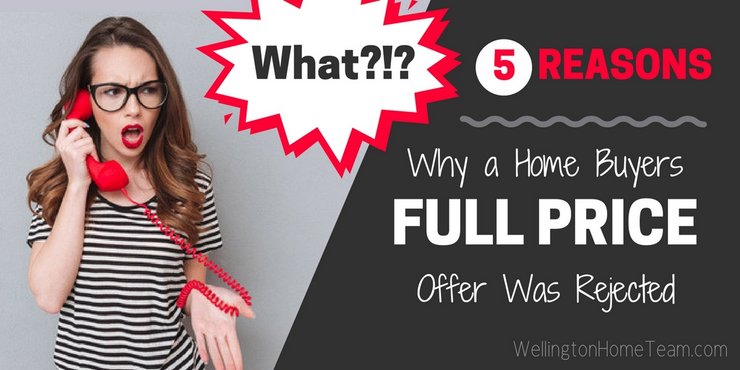5 Reasons Why a Buyer’s Full-Price Offer Was Rejected
Home buyers who submit a full-price offer on a home may wonder why their offer was rejected. Some may even think the seller has to accept their offer because it was for full price. First and foremost, a seller can reject any offer they want, even if it’s a full-price offer. Second, there are other terms to an offer besides the price. Sometimes those other terms can be a deal-breaker for the seller. Below we discuss the 5 most common reasons a buyer’s full-price offer was rejected.

5 Reasons a Seller Rejected a Full Price Offer
1. No Proof of Funds
Before starting their home search most buyers get pre-approved for a mortgage unless they’re paying cash. Occasionally there are a few buyers who don’t think it’s necessary to get pre-approved for a mortgage until they find a home. Unfortunately, this is very flawed thinking. While it may only take a few hours to be pre-approved for a mortgage the amount a buyer will be approved for is unknown until this point. So it’s imperative buyers get pre-approved for a mortgage before starting their home search.
If a buyer submits an offer without a mortgage pre-approval letter or proof of funds, if they’re paying cash, the seller will most likely reject the offer even if it’s a full-price offer. Every seller wants to make sure the offer they accept is from a qualified buyer who’s been pre-approved or has proof they have the funds to pay cash for their home.
2. Contingencies
There are a lot of different contingencies a buyer may include in their offer. There are some pretty standard contingencies like a home inspection contingency or a finance contingency. However, there are also more significant contingencies that aren’t common, like a home sale contingency. If a home buyer has one or more contingencies a seller may reject their full-price offer.
 3. Seller Concessions
3. Seller Concessions
Some buyers can’t afford to pay their own closing costs or don’t want to, so they ask the seller to pay for a portion or all of their closing fees. This is where a full-price offer may technically not be a full-price offer.
If a buyer offers the list price but asks the seller to contribute $10,000 toward their closing costs the seller is actually netting $10,000 under the list price and paying closing fees based on the full list price.
Now, some buyers understand offering full price and asking for seller concession isn’t really a full price offer. So they’ll add the number of seller concessions they’re requesting onto the top of the list price. So if the seller is asking $500,000 the buyer will offer $510,000 with a $10,000 seller concession. However, even though a seller may still net their list price they may still reject the above full-price offer.
4. Escrow
An escrow deposit, also known as an earnest money deposit, is the money a home buyer puts down as a sign of good faith when purchasing a home. Some buyers don’t understand why they need to put money down upfront. Some even feel it’s unnecessary, so they offer $0 or an amount well below the customary amount.
When a buyer puts little to no money in escrow a seller may reject their full-price offer. It could be seen as a red flag to the seller, either the buyer can’t afford to put money in escrow and/or they’re not very serious about purchasing their home. The average amount buyers put in escrow is usually at least 1%-3% of the purchase price. So on a $500,000 home, the buyer is expected to put at least $5,000 to $15,000. However, it’s not uncommon for buyers to put even more money in escrow if they are up against multiple offers.
5. Closing Date
Not all home sellers have a flexible close date, some need a quick close while others may need an extended closing date. So if the buyer’s desired closing date doesn’t line up with the seller’s desired closing date their full price offer may be rejected. Finding out when a seller wants to close or needs to close can usually be answered by making a phone call to the listing agent. So before a buyer submits a full-price offer they should find out when the seller wants to move and try accommodating that date.
Final Thoughts
Be prepared! Buyers should never assume a full-price offer will be accepted. They should have a pre-approval letter or proof of funds in hand prior to looking at homes. They need to understand the market conditions, limit their contingencies, know what escrow amount is customary for the area, and know when the seller wants to move.
By doing these things buyers will have a better chance of having their full-price offer being accepted.
If you think this article, 5 Reasons Why a Buyer’s Full Price Offer Was Rejected, was an interesting read please give it a share!
A majority of home buyers don't understand why a seller would reject their full price offer, but here are 5 reasons why their offer was rejected. #homebuyingPopular Questions About Real Estate Offers
The seller rejected offer without counter, is this normal? While it is not uncommon for sellers to reject an offer without countering, it can depend on various factors such as the seller’s motivations, market conditions, and the specific terms of the offer. Sellers may reject an offer outright if they find it significantly below their expectations or if they have received more attractive offers. They might also reject an offer without countering if they have specific requirements or contingencies that are not met.
Additionally, some sellers may choose to wait for more favorable offers to come in before engaging in negotiations. It’s important to note that every situation is unique, and sellers have the prerogative to handle offers as they see fit. Buyers can choose to submit a revised offer or explore other properties if their offer is rejected without a counter.
What happens when the seller did not respond to offer by deadline? When a seller does not respond to an offer by the deadline specified, it can be frustrating for the buyer. The lack of response typically means that the seller has chosen not to accept, reject, or counter the offer within the given timeframe.
In such cases, it’s advisable for the buyer to reach out to their real estate agent to inquire about the status of the offer. There could be various reasons for the lack of response, such as the seller being busy, considering other offers, or having changed their mind about selling. Communication between the parties and their respective agents is crucial to navigate the situation and determine the next steps.
If the seller rejects your offer is the negotiation process over? When a seller rejects your offer, it doesn’t necessarily mean the negotiation process is over. While the rejection indicates that the seller is not willing to accept your current offer, it leaves room for potential further negotiation. You can choose to revise your offer, taking into account the seller’s feedback or reasons for rejection.
It’s important to maintain open communication with the seller and understand their concerns or any specific terms they are looking for. Negotiation is a part of the home buying and selling process, so there might be opportunities to find common ground for both parties through counteroffers and discussions. However, it ultimately depends on the seller’s willingness to continue negotiating and finding mutually agreeable terms.
Can a seller reject a full price offer? Yes, a seller can reject a full-price offer. While a full-price offer typically matches the seller’s asking price, it does not guarantee automatic acceptance. Sellers may have various reasons for rejecting a full-price offer, such as if they receive other offers with more favorable terms or if they have specific requirements or preferences beyond the price.
Sellers have the right to evaluate multiple factors when considering offers, including the terms, contingencies, financing, and overall suitability of the buyer. It’s essential to remember that real estate transactions involve negotiations and that the acceptance or rejection of an offer ultimately lies with the seller.
Should you ever offer full price on a house? Whether to offer full price on a house depends on the specific circumstances and dynamics of the real estate market. Offering full price can be a strategic move in certain situations, such as in highly competitive markets with limited inventory. It demonstrates your seriousness and commitment to the property, potentially giving you an advantage over other buyers. Additionally, offering full price can streamline the negotiation process and increase the likelihood of acceptance.
However, it’s important to consider factors such as the property’s value, condition, market conditions, and the advice of your real estate agent. In some cases, there may be room for negotiation or factors that warrant offering less than the asking price. Assessing the market and understanding the unique aspects of the property can help you determine whether offering full price is appropriate in your specific situation.
About the Author
Top Wellington Realtor, Michelle Gibson, wrote: “5 Reasons Why a Buyer’s Full-Price Offer Was Rejected”
Michelle has been specializing in residential real estate since 2001 throughout Wellington Florida and the surrounding area. Whether you’re looking to buy, sell, or rent she will guide you through the entire real estate transaction. If you’re ready to put Michelle’s knowledge and expertise to work for you call or e-mail her today.
Areas of service include Wellington, Lake Worth, Royal Palm Beach, Boynton Beach, West Palm Beach, Loxahatchee, Greenacres, and more.

 Michelle Gibson of the Hansen Real Estate Group Inc is a full-time REALTOR who has been specializing in Wellington, Florida real estate since 2001. This veteran of the real estate industry has expertise in technology, marketing, and social media.
Michelle Gibson of the Hansen Real Estate Group Inc is a full-time REALTOR who has been specializing in Wellington, Florida real estate since 2001. This veteran of the real estate industry has expertise in technology, marketing, and social media.
Very good points and they all have happened to me as a seller.
On top of the earnest money deposit, I also require a Due Diligence fee. It may seem a little obnoxious, but here is what happened to me twice (I’m even ashamed to say that it happened more than once…). We are currently in a seller’s market and the buyers have a hard time to find the house they dream about at the price they can afford. Two of my buyers signed PSA’s and then, without my knowledge of course, a second PSA with another buyer “just in case”. Well, one of the buyers disappeared. Literally. Even his realtor could not find them anymore. AWOL. The second buyer decided that the location of the second house was more appealing and decided to cancel the contract. I had to reimburse the EMD and put the house back on the market. I don’t have to tell you about the expenses of holding a house… Hence, the requirement of a Due Diligence fee now. If they refuse that clause, I go to the next buyer. It is that simple.
Great information to share with buyers that need a little help getting their offer noticed! We had a buyer loose a house because they did not want to put anything in escrow.